Why Corporates should pay careful attention to SDG #17
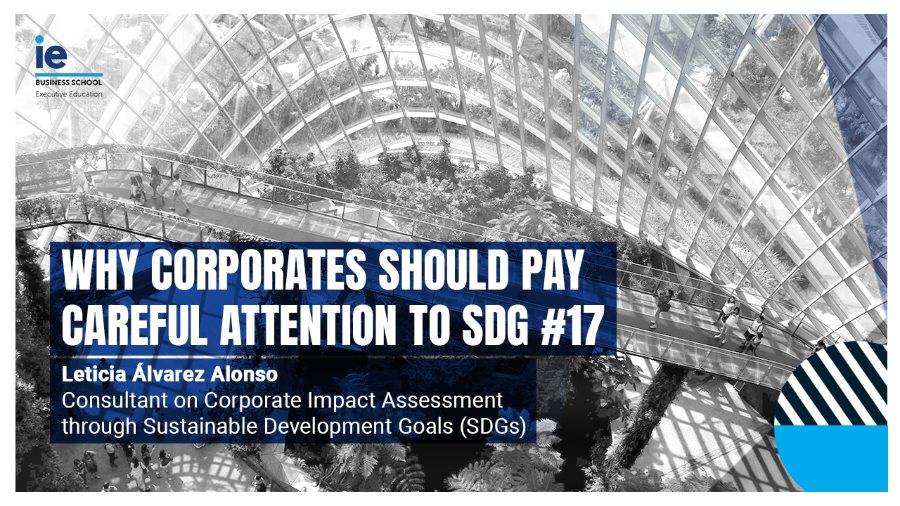
Author: Leticia Álvarez Alonso, Consultant on Corporate Impact Assessment through Sustainable Development Goals (SDGs)
Sustainability is undoubtedly one of the driving forces that will shape the economic landscape in the coming decades. Customers want the products and services they consume to be produced sustainably. Workers call for purpose beyond profits to engage with a company. Regulators are working hard to create a framework to drive sustainability.
Investors are also increasingly becoming activists, channeling funds mainly to companies that demonstrate sustainability. BlackRock, the world’s biggest fund manager with over seven trillion in funds, has announced that sustainability is its new investment pillar:
“Given that investment strategies have the potential to provide clients with better results, we are placing sustainability at the epicenter of the way in which BlackRock manages risk, builds portfolios, designs products, and interacts with companies.”[1]
Sustainability means that the line between the private world and “the common” or shared world has been blurred. In the past, as the common was not valued, it was overexploited while its protection was eventually left to the public sector—governments, multilaterals, etc.—as well as to some NGOs. Now, the private sector must take the lead.
Today, we need companies with purpose. But how is this achieved? How can a company make the transition to sustainability and purpose?
SDG 17 is about partnerships
How do we define sustainability? There are many ways to understand it, but fortunately, since the end of 2015, we have the 17 Sustainable Development Goals (SDGs), which make up the UN’s 2030 Agenda. For the first time, all actors—local and multilateral, private and public, for or not-for-profit—have defined and shared 17 objectives to work towards in the coming years.
Sustainability today is about achieving those 17 goals.
SDG 17 seeks to meet the ambitious goals of the 2030 Agenda through cross-cutting partnerships, whether between national governments, the international community, civil society, the private sector, or any other actor. For companies seeking to introduce sustainability into their business models, alliances are key. In the for-profit world, companies form strategic alliances with each other to make a bigger impact. And these allies must be ones that facilitate the development of business models with purpose.
NGOs and foundations (together “non-profit organizations” or NPOs) have been working on these issues for many years, and they’re very familiar with the problems and solutions that come along with them. In fact, NPOs have access to, and knowledge about, entire groups of people that companies traditionally do not reach, such as disadvantaged groups in local communities or people in developing countries. They have also spent years implementing solutions to environmental issues. But they’re doing it on a small scale.
Increasingly, companies are realizing that their role in society can go far beyond just making profits for their shareholders.
The 2008 crisis raised a big question about the credibility of the economic and financial system. The SDGs, having specified objectives that explicitly involve companies in order to achieve them, have precipitated the process.
At the same time, NGOs have been suffering from funding shortages, due to the fiscal containment of many developed countries. And, at the same time, new forceful actors are emerging in the not-for-profit ecosystem, such as far-reaching foundations of large companies.
Companies have resources—from specialized personnel to the possibility of generating funds—and, above all, the power to scale up successful business models. The alliance between companies and NPOs is one of the keys to the future economy. The differences between the two make them complement each other and work well together, and the key to successful partnerships is to ensure that companies and NGOs are equal actors in the partnership, each responsible for their area of expertise.

Source: ENDEVA, NGO and company partnerships for inclusive business
We’re no longer seeing the traditional CSR relationship in which the NGO executes and the company acts as a donor without further involvement. It is about moving from philanthropy to inclusive or purposeful business models that can have a far-reaching and long-lasting impact on the world.
Innovation is at the core of the success of corporation-NGO partnerships
Initially, in the CSR world, the motivation for forming alliances was focused on reputation and credibility for companies, and obtaining funding for NGOs. However, companies have gradually come to realize that leveraging and deploying corporate skills and assets in their alliance with NGOs results in greater impact than purely financial support.
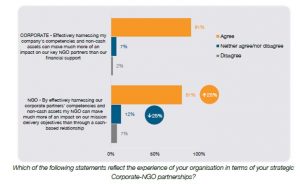
Source: C&E Corporate-NGO Partnerships Barometer, 2019
NGOs have also recently begun to recognize that the expertise a company provides through a partnership is very important to obtain results and make them scalable, and that the financial component is not the most relevant contribution from companies.
In fact, in a 2019 survey of NGOs partnering with companies, 81% of NGOs recognized that the non-financial capacities of companies were more important than the financial ones, in terms of making an impact. The fact that this percentage is up by 25 points relative to 2018, shows that the NGOs are increasingly realizing that these alliances lead to better outcomes for their beneficiaries.
What has made this possible? The widespread introduction of innovation, both technological and social. Companies are forced to innovate in order to provide a market response—one which is scalable and sustainable—to customers with different needs and to markets they didn’t previously reach. An interview conducted with corporations and NGOs working together showed that the second biggest motivation for both of them was to trigger innovation.
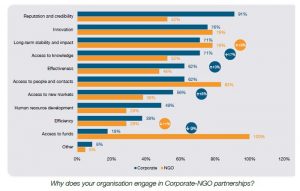
Source: C&E Corporate-NGO Partnerships Barometer, 2019
In fact, when companies try to explore inclusive business opportunities on their own, they usually don’t generate as much innovation. This is because their employees’ experience and ideas are focused on simply bringing existing products to new markets. However, the interaction with NGOs helps them understand the greater breadth of opportunities associated with going back to the technology underlying existing products and innovating from there[2].
Corporation-NGO partnerships help companies find purpose
In addition to encouraging new types of innovation, alliances between companies and NGOs are strategic, in the sense that they permanently affect the companies’ business practices. On the one hand, an alliance helps the company better understand the social or environmental problems it seeks to solve. The NGO knows its beneficiaries and the ecosystem in which they operate, after many years of focusing on these groups.
They also thoroughly understand the environmental issues. In short, an alliance brings the company closer to the issues and helps it understand its potential clients and their non-market environment. Without this valuable knowledge from NGOs, it would take years for companies to know how to access these new markets and clients.
As companies adapt to these strategic alliances, they themselves experience critical changes in their operations and business models.
By working with a sustainability perspective, businesses often find that their practices need improving on a wide range of issues, such as pursuing an inclusive economic growth, sustainable market development, and environmentally sustainable practices; efforts to identify and tackle the risks of modern slavery in supply chains; or rising levels of obesity among consumers.
Both companies and NGOs acknowledge that their collaboration results in improved knowledge of sustainability issues and more suitable business practices to achieve them.
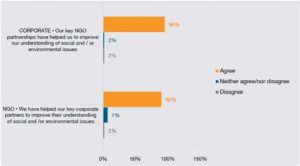
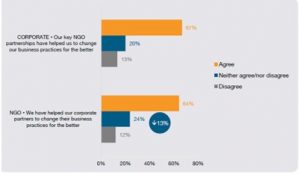
Source: C&E Corporate-NGO Partnerships Barometer, 2019
Some rewarding cases of corporation-NGO partnerships
GSK-Save the Children
The partnership goes well beyond the traditional corporate charity fundraising model. Since 2013, GSK has been combining their capabilities in R&D, supply chain, procurement, and vaccines with Save the Children’s experience working with the most vulnerable children.
The experience of the NGO in developing countries actually led to the development of a new antiseptic gel modified from a GSK mouthwash: “Our chlorhexidine gel, formulated from the simple antiseptic commonly used in mouthwash, has been used to treat the umbilical cords of over 30,000 newborns in Kenya and protect the babies from potentially life-threatening infection.” The gel helps prevent infection, which is the cause of many newborn deaths. The demand for this life-saving gel is through the roof.
The partnership between GSK and Save the Children focuses specifically on:
- Improving access to basic healthcare—prevention and treatment—where the need is greatest
- Training and equipping healthcare workers in the poorest communities
- Developing child-friendly medicines
- Working at local and global levels to call for stronger child health policies
In their seven years of partnership, they have reached over 2.98 million children in 46 countries, all potential new customers. Over 114,000 children under five have been fully immunized and over 282,000 children have been treated for diarrhea, malaria, or pneumonia.
Apart from that, the partnership is boosting GSK’s healthcare innovation, as they are developing mobile technology for online healthcare[3].
Danone-Ellen McArthur Foundation
In January 2017, Danone and The Ellen MacArthur Foundation announced a partnership aimed at accelerating the global transition to a circular economy. Through this partnership, Danone’s teams are working with the foundation to generate widespread understanding of the circular economy and to drive behavioral change in an effort to transition its brands toward this type of economy. Evian has set the objective to become 100% circular by 2025, and is working in close relationship with The Ellen MacArthur Foundation to define its circularity roadmap, moving from a linear model to a circular one. It has benefited greatly from the knowledge and guidance of the foundation to embed the circular economy principles in its brand.
Danone also joined the New Plastics Economy Initiative as a core partner, where together with competitors such as Nestlé, they seek cross-sector collaboration to rethink and redesign the future of plastics, starting with packaging. Danone’s participation in this initiative will contribute to the company’s efforts to co-build the circular economy of packaging, by sourcing regenerative materials and creating a second life for all plastics.[4]
Fashion Sector: Marks&Spencer and Oxfam: “Shwopping”/Zara-NGOs
This partnership allows consumers to donate old clothes they no longer use. Each item of clothing (whether from M&S or not) helps to reduce poverty. The “Shwopped” items are resold, reused, or recycled to allow Oxfam to fund all sorts of vital projects around the world. Since 2008, the M&S and Oxfam Shwopping partnership has collected over 20 million items, worth an estimated £16 million to go towards Oxfam’s work.
Working in partnership with Oxfam Shwopping is expected to help increase the volume of unwanted clothes that are recycled and reduce the volume thrown away. “We want to turn the tide on waste and start the journey towards making our fashion business truly sustainable. Our eventual aim is to recycle as many clothes as we sell—that’s hundreds of millions of items each year! M&S has committed to help customers recycle over 50 million items of clothing by 2020.”
Impact on Marks & Spencer sales: if the customer “Shwops” at Oxfam stores, and have an item of M&S clothing returned, Oxfam will give them a £5 M&S voucher to spend in store, usable for purchases of £35 and up.[5]
Zara has a similar project in partnership with several NGOs. Used clothes are donated, recycled, transformed into new fabric, or sold to help finance the social projects of these non-profit organizations. The goal of this project is, in addition to lengthening the useful life of clothing, to generate a positive impact by collaborating with local organizations.
If the world’s challenges are to be tackled, the solutions must be engineered at a large scale, and only large companies have the resources and the logistics to transform projects into scalable business models. Introducing NGOs into the formula helps companies find and implement business models with purpose—in an innovative and efficient way. Let’s take advantage of all the win-win results that these partnerships bring.
[5] https://www.marksandspencer.com/c/plan-a-shwopping
[4] https://circular.evian.eco/the-loop/emf
[3] https://www.gsk.com/en-gb/about-us/save-the-children-partnership/the-app-that-could-save-lives/
[2] Internal challenge organized by Royal DSM designed to explore inclusive-business opportunities. ENDEVA, NGO and company partnerships for inclusive business.
[1] https://www.blackrock.com/corporate/investor-relations/blackrock-client-letter


